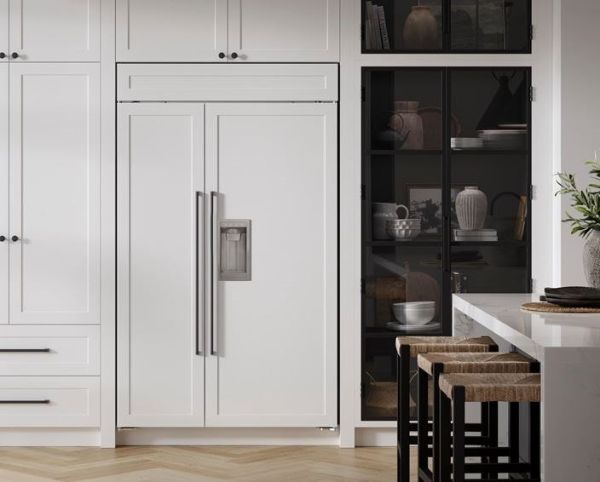Built-in refrigerators have gained popularity in modern kitchens due to their sleek design and seamless integration with cabinetry. While they offer numerous benefits, it’s important to weigh the pros and cons before investing in one.
Here we’ll explore the advantages and disadvantages of built-in refrigerators to help you make an informed decision for your kitchen.
Table of Contents
Pros of Built-in Refrigerators
- Aesthetically Pleasing: One of the major advantages of built-in refrigerators is their ability to blend seamlessly with the kitchen design. They are custom-designed to fit flush with cabinetry, creating a sleek and cohesive look. This feature allows for a more streamlined and sophisticated appearance in your kitchen.
- Space Optimization: Built-in refrigerators are designed to maximize storage space. They often have a larger capacity compared to freestanding models, offering more room for groceries and food storage. Additionally, the layout of shelves, drawers, and compartments in built-in refrigerators is optimized for efficient organization and easy access to your items.
- Customization Options: Built-in refrigerators offer a wide range of customization options to suit your specific needs. You can choose from various sizes, configurations, and finishes to match your kitchen style and layout. Some models even allow customization of the paneling and handles, giving you the freedom to create a personalized look.
- Energy Efficiency: Many built-in refrigerators come with advanced energy-saving features. They are often designed to meet higher energy efficiency standards, which can result in long-term cost savings on your utility bills. Additionally, these refrigerators are well-insulated and sealed, minimizing temperature fluctuations and keeping your food fresher for longer.
Cons of Built-in Refrigerators
- Higher Cost: Built-in refrigerators typically come with a higher price tag compared to freestanding models. The custom design, premium materials, and advanced features contribute to their elevated cost. It’s important to consider your budget and weigh the long-term benefits against the initial investment.
- Limited Flexibility: Once a built-in refrigerator is installed, it becomes a permanent fixture in your kitchen. This lack of flexibility can be a drawback if you plan to move or remodel in the future. Unlike freestanding models, built-in refrigerators cannot be easily relocated or transferred to a different space.
- Installation Complexity: Installing a built-in refrigerator requires professional expertise and can be more complex than simply plugging in a freestanding unit. It involves precise measurements, cabinetry modifications, and proper ventilation to ensure optimal performance. The installation process may require additional time, effort, and cost.
- Potential Space Constraints: While built-in refrigerators offer ample storage space, they may have limitations in terms of size and dimensions. The custom fit means that you need to consider the available space in your kitchen and ensure that the refrigerator fits properly without compromising other elements. In some cases, this can pose a challenge if you have a small or irregularly shaped kitchen.
Pros and Cons of Built-in Refrigerators
| Pros | Cons |
|---|---|
| Aesthetically Pleasing | Higher Cost |
| Space Optimization | Limited Flexibility |
| Customization Options | Installation Complexity |
| Energy Efficiency | Potential Space Constraints |
Conclusion
Built-in refrigerators offer a range of benefits, including their aesthetically pleasing design, optimized storage, and customization options. They can elevate the overall look of your kitchen while providing efficient cooling and energy-saving features. However, it’s important to consider the higher cost, limited flexibility, installation complexity, and potential space constraints associated with built-in refrigerators. By carefully weighing these pros and cons, you can make an informed decision that aligns with your kitchen requirements and personal preferences.
Remember to assess your specific needs, budget, and kitchen layout before investing in a built-in refrigerator. Consider consulting with a professional to ensure a seamless installation and to explore various models that suit your lifestyle. With careful consideration, you can enjoy the benefits of a built-in refrigerator that perfectly fits your kitchen and enhances your culinary experience.

